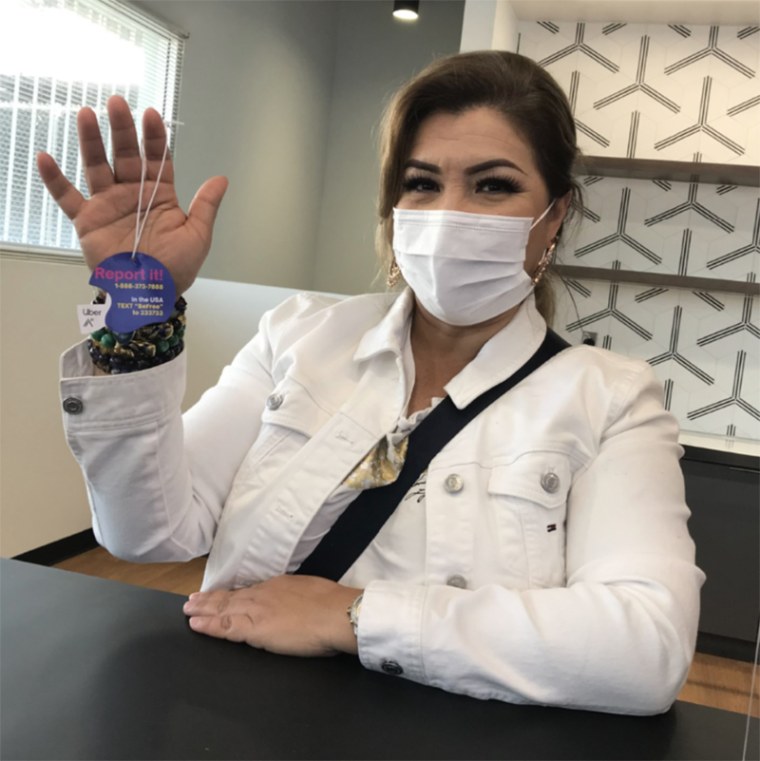With kickoff less than three weeks away, the excitement around the Super Bowl is palpable.
The big game often comes with worries about potential increases in sex and labor trafficking because of the influx of visitors and crowds.
Experts say this year's host city, Los Angeles, is especially vulnerable because of its proximity to airports and the U.S.-Mexico border and because it has a large immigrant population.
But people who work to prevent trafficking every day say the problem needs focused attention year-round, not just during big sporting events. Still, companies are ramping up campaigns to inform people about red flags to look out for regarding possible victims.
“We absolutely prepare for big events, whether that’s the Super Bowl, the Olympics, anything that has been going on in our cities. We make sure that we are beefing up operations,” said Carrol Chang, global head of driver and courier operations for Uber.
The company is staffing up its public safety team, distributing tags to drivers in the Los Angeles area with the phone numbers of national and local hotlines where they can report suspected trafficking. It's also blasting drivers nationwide with information about what to look out for if they suspect someone is a victim of trafficking.

“This is a global issue,” Chang said. “It affects estimates of about 25 million people worldwide, and so we do feel that at the size and scale at which Uber operates, in 80-plus countries around the world, millions of trips happening every day, that we do have a part to play.”
Uber drivers say they’re sometimes the first people to notice when someone might be in danger.
“We find ourselves closer than the police can be at any given time,” said Eva Blanco, an Uber driver in the L.A. area for four years.
She said she picked up a teenage girl in March and immediately felt like something wasn’t right. A man put the girl in her car without any apparent regard for her safety, Blanco said.
When Blanco asked her to put on a mask, she took a pair of panties out of her backpack to use as a facial covering. Blanco said her suspicions grew when the girl shared where she was headed — a party at a hotel.
“My mom instincts came over and I just felt scared for her, because I know no young girl is going to be safe in a hotel, partying with other people,” Blanco said. “I tried to explain to her that maybe wasn’t the safest place for her to go.”
Blanco said she called 911, waited on hold for the police and followed up with Uber, but she’s not sure what happened to the girl.
“I believe she was giving me the details of her life or sharing some of what was going on in her life, asking for help,” Blanco said.
She said it’s important for drivers to know the warning signs but admitted to feeling helpless in this kind of situation.
“I wish I could have done more for her,” Blanco said. “It felt like I was just handing her over to God knows what.”
Uber’s campaign is part of a broader push from It's a Penalty, an anti-trafficking and -exploitation group that has secured the participation of American and Southwest airlines, which will show in-flight videos about trafficking.
IHG Hotels and Resorts, Hilton and Motel 6 will display posters with information on how to handle suspected exploitation.
The Los Angeles Super Bowl Host Committee said in a statement that it's working with national and local anti-trafficking groups, including the U.S. Institute Against Human Trafficking and It’s a Penalty, "to raise awareness, offer community training, provide victim services, and coordinate with local law enforcement around major events, including the upcoming Super Bowl in Los Angeles."
Warning signs that someone may be a potential victim include people acting like someone told them what to say, behavior that indicates they’re being controlled and fear of talking to someone who’s trying to help, said Kay Buck, CEO of the Los Angeles-based Coalition to Abolish Slavery and Trafficking.
“I absolutely think that there is a place for ride-share companies, airlines, and all of these companies do have a role to play, and not just ones where trafficking is prevalent, either,” Buck said, adding that recent studies have shown big events don't necessarily result in a substantial increase in trafficking because it's a year-round problem.
She said her organization has seen a large increase in calls during the pandemic.
“Last year, we had over 2,500 hotline calls, and this was the highest number of hotline calls in our entire history of 23 years as an organization,” Buck said. “People have lost their jobs. People are more vulnerable to the tricks and the lies those traffickers are using to traffic them.”
